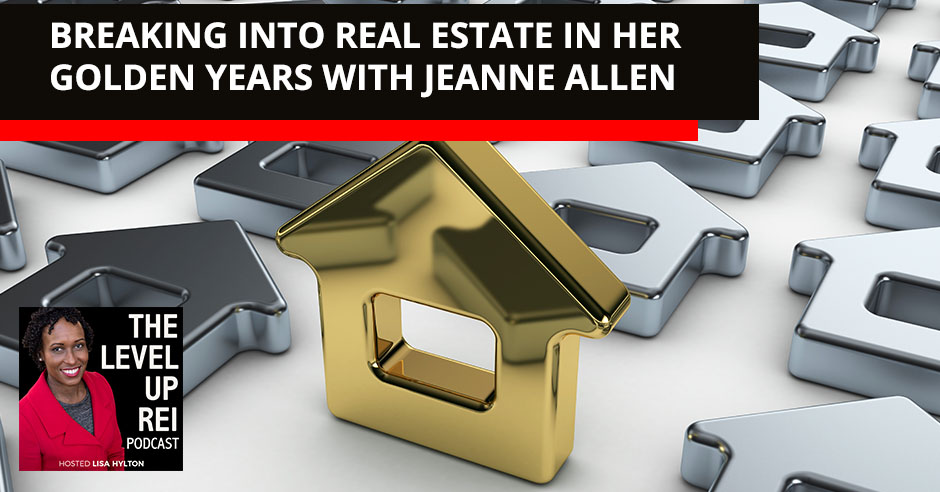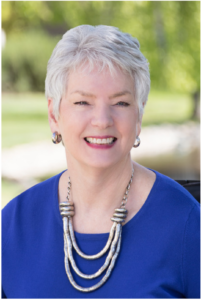
Age is just a number. It’s never too late to start investing in real estate. Such as the story of Jeanne Allen, who literally broke into the industry in her golden years. Jeanne is the Director of Acquisitions of Valley of the Moon Investments. She’s a multifamily syndicator with over 253 units under management as a general partner. Jeanne also used to work in the corporate world before jumping into the real estate industry. And it wasn’t easy. Join your host, Lisa Hylton as she sits down with Jeanne to talk about her journey to real estate. Find out why she wanted to do it, how she did it, and what she is doing now. Also, learn what multifamily real estate is, why education is important, and how you can find partners.
—
Watch the episode here
Listen to the podcast here
Breaking Into Real Estate In Her Golden Years With Jeanne Allen
I am super excited for another amazing episode. With me, I have Jeanne Allen. She is the Director of Acquisitions of Valley of the Moon Investments. She’s a multifamily syndicator with 253 units under management as a General Partner in Texas across three properties. Additionally, she’s a passive limited partner in 239 multifamily units in Texas, Georgia and New Hampshire. All 492 units have been acquired since 2018 when she first discovered the benefits of real estate investing with multifamily. She studied with RE Mentor, Multifamily University and FortuneBuilders to build a foundation to be an effective steward of investors‘ capital to fund large multifamily syndications. Though she is a fellow California resident, a landlord–friendly Texas is her chosen multifamily market due to population and job growth. Her buying criteria are value-add B and C properties between 75 to 200 units with significant rental upside. Prior to real estate, Jeanne’s career was in the business and financial world managing sales and inventory planning for major corporations like Levi‘s, Ross Stores, and Mervyn’s. Nonetheless, I am super excited to have you on the show. Thank you for coming.
Thank you, Lisa. I’m excited to be here.
I have remembered when I saw you first, a friend of mine sent a picture of yourself and some members of your team in an acquisition that you did a hearing 2021 in Texas. It was all women. I remembered seeing you in a wheelchair. I saw you being a part of this team that had acquired this acquisition. That is so inspiring. Even though I didn’t know your story, I just saw it. How many people out there would say, “With what’s going on in my life, I’m not going to pursue the things that I want to do because of X, Y and Z?” I’m excited to have you on. To kick things off, wherein California do you live exactly?
You're still the same person in your 60s that you were in your 40s. It's never too late to start doing something. Share on XI live in Sonoma Valley, California, which is a wine country, only about fifteen minutes away from Napa Valley. Our wine is as good as the Napa Valley wines.
What do you and your husband like to do for fun?
We were having a big discussion about that. During COVID, the good news, the bad news is all we did was real estate. Our social life disappeared as it did everybody else are. We had real estate to focus on. It was a very productive year for us. When we are not totally focused on real estate, we love to go places. I am tourist extraordinaire. The basic answer that people will say is travel. I get it. Travel is what I love to do. We’ve got a new puppy. We have a three–month–old Goldendoodle. It has been a while since we have had a dog in our lives. We have found out that apparently, a dog does take over your life. That’s what we love to do too. Once he gets all his vaccinations, we are going to combine travel with a dog.
Can you talk to me a little bit about your journey to real estate syndication? What inspired that?
We had never heard of real estate syndication until years ago. My husband and I were not in our 20s and 30s anymore, we are both retirement age. We both retired from our day jobs. We decided in retirement that we wanted to do single-family fix and flips. We always had real estate in the back of our minds about doing something but we never were quite sure what that was. We didn’t want to be a landlord for a rental house. We through our years of marriage have renovated, remodeled and built four houses. We built one from the ground up. Not ourselves. We didn’t swing the hammer but we did all working with the architect. I joke that we didn’t get divorced in any of those processes. Evidently, we liked doing houses together. We decided to be single-family fix and flippers. We signed up for an education course. You mentioned all the education we have been through. That one was FortuneBuilders. That was where we discovered multifamily. They are truly single-family fix and flippers but they do have a little side program of commercial multifamily investing and syndication. We took that six-day course and we are hooked. We never did flip a single house. We jumped right over to multifamily.
A couple of things before we get deeper into the multifamily. The first thing is finding your path, even the desire to do anything in retirement. Some people feel that when they get into retirement, they are going to do nothing. Is that a fallacy? At the end of the day, you are human, you want the challenge and you want to continue growing.
One thing that comes up is my age, it’s dead in retirement space. All of the people that are younger than 65, it’s around the corner. You are not going to believe it. Day–by–day goes by, you are living your life. One day you wake up and go, “I’m on retirement age. How did that happen?“ You are still the same person in your 60s that you were in your 40s, 50s, 30s or 20s. Life has changed since our grandparents and our great grandparents. We are not expected to sit on the front porch and rock away the rest of our lives waiting to die. We, as a society, are much more active than our parents, our grandparents or our great grandparents. It never occurs to chipping me that we are old. It’s like, “Are we old?“ We are not old. We are just older. We are not golfers. A lot of people do golf. A lot of people do travel constantly. I would love to do that but it does cost quite a bit of money to travel constantly. We are thinking to keep building up this nest egg a little bit and then go crazy with the travel.
On your journey, you did your first acquisition in 2018. Can you talk about the process of that happening, starting with perhaps the aspects of building a team and finding like-minded people to build a team of it?
Our first acquisition was being an LP, Limited Partner, in somebody else’s deal. That was not finding a team. That was investing money. It was finding someone to invest that money with. Before getting involved in the multifamily real estate world, we did not even know there were opportunities to invest your money with a syndicator and get yourself diversified out of the stock market. It wasn’t so much as building a team in that case. It was about exploring new alternative investments called real estate and syndication.
What were some of the things that were pivotal to you when you were doing that exploration to get you comfortable making that first passive investment?
Education. You need to know a little bit about what you are investing in. I will have to say, when we started in the stock market, we didn’t know anything about the stock market. We plunged in and certainly made a lot of mistakes there. In real estate, we decided to get a little bit more educated. It’s a whole different language of things like cap rates, LOIs, NOIs, five-year holds, IRRs, AARs. If you don’t know the language, you don’t know what people are talking about and getting enough knowledge to know what you are investing in. One of the misunderstandings that we had been when we invested in our first deal was, I didn’t truly understand the concept of cashflow. It sounds pretty obvious.
The LP opportunity that we’ve got ourselves in is syndication that is a redevelopment project. The syndicator has taken it down to the bones in combining two buildings into one property. Therefore, we have been in this investment for years and we have not made a single penny of cashflow. This property is all about appreciation and selling it on the backend. I didn’t have enough education to understand what I was getting myself into. Once we’ve got more education and understood, you are not going to see any money on this for 3 to 4 years because this is a big redevelopment project. That’s why education is important. To understand the money, you are putting in, what you get back out of it, when and how much.

Golden Years Investing: Education is pivotal to making your first investment. You need to know a little about what you’re investing in.
Moving a little bit onto when you did do your investments that you are an active partner, can you talk about maybe even the education and team–building connected to that?
We started getting into GP, General Partner, positions in 2020. That happened as we’ve got more knowledge, education and understanding of how all these works. The third education group that we had hooked up with our mentor is great about connecting, networking and hooking you up with sponsors. Our intent and direction were to be active investors ourselves to find the property, buy the deal, get our investors and operate the property to be that active operator. On our path, we met people that were already doing it. They invited us into their deal as we invested. They also invited us into their deal on the general partner side. With RE Mentor, so much of what they do is education support and mentoring. By bringing us in as a general partner, it let us be the fly on the wall of what was happening with what they were doing.
Also, by being partners with them, we are picking up the phone and calling them about questions we have on pursuing our own deals and questions we have about the deal that we are in with them as a general partner. As I look back over 2020, it evolved this conversation, partnership, trusting and knowing each other, any of these. When you meet somebody on day one, you might like them but when you have been communicating with them and working with them for a year, you know, like and trust them. This January 2021, I did finally find the deal that made sense. I took it to these general partners of ours. They ended up being our sponsors. They are in our deal as well as us being in their deal. It goes both ways.
Can you talk about your process of finding that property?
It’s not as big of a mystery as people make it out to be like, “How do you find your broker?” You do need to build broker relationships. For the past years, I was very tenacious in building broker relationships. The first is finding the brokers. There are all different kinds of ways to find brokers. People suggest you go on to LoopNet, not to find the deal but to find the brokers. That’s a good way to do it. Go on CREXi, not to find the deal but to find the brokers. There are nationwide brokers no matter what market you are in. Marcus & Millichap is everywhere. Look up Marcus & Millichap. Dial into your state, your market and start calling Marcus & Millichap brokers. They are waiting for you to make a phone call. They are not hiding. People make it sound like you’ve got to dig under rocks to find brokers. You don’t. You look up their website. You see who the players are. You get yourself educated, you are asking the good and right questions so that they don’t think that you are somebody who walked in off the street, heard a podcast, and made a phone call.
There’s Marcus & Millichap. There’s a big one there. There’s CBRE and North Mark. There are a lot of commercial real estate brokerages that focus on multifamily. It’s not a mystery. You then find out who they are. You start making phone calls and looking at the deals that you send them. You asked to be on their mailing list and they start sending you deals. There’s a big off-market deal thing that people are so entranced with. Most people don’t get deals off–market. When we are new, we are probably not going to get deals off–market. Be happy with the fact that you have made a broker contact and you are talking to them regularly.
One of the big things that my husband and I did, Chip, is last September of 2020, we’ve got in our minivan and drove to Texas from California. We took five weeks down. You have already heard that we are retired. We have that luxury. We drove to Texas. We spent a couple of days in Lubbock. That was the first Texas City we came to. Let’s talk to people and we love it. We went to Dallas Fort Worth and spent a couple of weeks in DFW. I had already built relationships with most of these people. It was a matter of, “Finally, we get to meet each other.“ There were some I hadn’t built deeper relationships with but they are willing to meet with you as well. Sometimes it was at their office. Sometimes it was at a property that was on the market, a property tour. We did DFW. We went down to Austin and San Antonio.
How you found this deal?
In real estate, you need to find the broker, not the deal. Share on XBuilding broker relationships and getting on email lists. Once you are on the email list, you get a lot of properties coming across your desk. You have to decide. Is this the right property for me to pursue? We had underwritten a lot of deals, put in Letters of Intent, LOIs, on quite a few properties and got the best and final on quite a few properties before. Why I dug into this one and didn’t let it go was because, in this relationship building that we did in 2020, we had built a relationship with a property manager, the property manager that our partners that we are GPs within their deals. Especially on this driving trip that we took to Texas, we met with Kathy. We were with her for six hours and we’ve got to know her well. We know, like, and trust each other.
When I saw this particular property and Fort Worth come across my desk, like many of the others, I ran by Kathy and said, “What about this one?“ She said, “I love Ridgmar Townhomes. It’s on the market.“ I was like, “We’ve got to dig into this one a little bit deeper.“ Truthfully, the numbers did not work. When we first did the first underwriting, it’s like, “This is expensive.“ We’ve got our sponsors involved. Our sponsors underwrote the deal with us. We underwrote this property in several different ways. It turns out there is more than one way to underwrite a property. Part of it is financing, how long is your whole period and what are the splits going to be between you and your investors. There’s not just one way to underwrite a property. If you find a property that you think has potential for whatever reason, keep working the numbers until a light bulb goes off. It’s very competitive out there. It’s stupid prices. Some of the properties I’m looking at, I was like, “They are asking how much? How do you make the numbers work on that?” There are a lot of properties that we are not going to be able to make the numbers work on.
What would you say were the key things that enabled you all to make the numbers work on the one that you did do here?
Going with the bridge loan was the difference. The agency loans still have a lot of COVID restrictions where you have to have 12 months or 18 months of reserves. That kills the returns when you’ve got money sitting there, not working for you. The bridge loans don’t require that. They are a little bit higher interest rate. Not that extremely high. They used to be extremely higher than the agency loans. They were not. We ended up paying 4.25% on the bridge loan, which is not a bad number. It also allows you an interest–only period. We have three years of interest–only with the ability to extend it one more year and then one more year after that. It’s called a 3 plus 1 plus 1, having that kind of flexibility on a property, especially when you are only looking at a 5 to 7-year hold. One of the problems with agency loans is that they are ten-year loans. If you want to sell earlier than ten years, you have this huge prepayment penalty you have to deal with. You have to factor that into your exit strategy if you are going to have to pay a prepayment penalty. The bridge loan made the difference for us on this one.
As you talk about the bridge loan getting financing, one of the things that might be lost in the shuffle here for readers is that did you have multifamily experience as a GP before buying this deal?

Golden Years Investing: There’s not just one way to underwrite a property. If you find a property that you think has potential, for whatever reason, just keep working the numbers until your light bulb goes off.
That’s part of the reason that we needed to bring the sponsors in. We did not have sufficient multifamily experience to qualify with the lender. To qualify with a lender on large multifamily deals and when we say large, this was a $6.5 million deal, is you have to have three things. One is multifamily experience. One is net worth and one is liquidity. The net worth and liquidity are all in relationship to the loan. We did have other partners already with us. It probably covered the net worth angle without bringing in sponsors possibly qualified on the liquidity. Liquidity means that you can sell it tomorrow and have liquid money. If you’ve got a bunch of your money tied up in the real estate, that’s not liquid. One thing to keep under consideration as you are building your business if that’s what you are doing in multifamily is to keep liquid enough that not everything is tied up in real estate that you can’t sell tomorrow. The third thing is the multifamily experience. With that, the lenders want you to have a couple of three years, if not more and multiple properties of significant size. We are not quite there yet. For a while, we are going to need to bring in sponsors.
That’s where we are building those strategic relationships. RE Mentor helped you to get connected to those people who do have that experience, managing those multiple multifamily properties, have loan experience for the lender to be able to then make that first acquisition and to build from there. That’s super important. It’s one of the things that I want to point out. A lot of people, when they run across that roadblock might say, “This is not for me. I can’t go any further. I don’t have any of these experiences. How I am going to get, as opposed to who do I need to get on my team to help me to get to that next level,” which was so important in terms of what you have done. Going further from there, in terms of this deal, like us, you and your partners got this deal under acquisition. I know that the way you even paid it forward in terms of allowing, being able to provide opportunities for other people who are also interested in investing to then get an opportunity to invest in the deal as a limited partner but also even get experience on the GP side. Could you talk a little bit about how you decided to make that opportunity possible?
In 2020, we’ve got into a couple of deals with people that we had created a network with to be general partners with them in their deals. It was a 1% ownership but it was being a general partner in their deals. What that allowed us to do is I can talk to brokers. Even before we’ve got the 60-unit property, when I was talking with brokers, I was able to say, “We are in a couple of deals in Texas. One is in Denton, Texas 133 units. We’ve got another property in College Station, 60 units.“ I don’t have to tell them it’s a 1% interest. You don’t have to tell them that. You are a general partner in 60 units in College Station and 133 units in Denton. They were like, “This person has got some experience.“ Therefore, that helped us so much as we’ve then got into our own deal. We extended that same kind of opportunity to other people that are in that beginning stage of getting into active multifamily investing.
It only makes sense if you are trying to do active multifamily investment. If you want to be a passive investor, it doesn’t benefit you to be a GP. If you want to be an active investor, it benefits you greatly to be a GP in somebody else’s deals. We put it out there on Facebook as well. We’ve got several people who recognized that that would be of assistance to them. We brought in GPs onto our team. One of the GPs came to the closing with us. She had not been involved in the deal at all until we met her on Facebook. She ended up flying from Chicago to Fort Worth to be with us at the closing table.
I want to pivot a little bit onto acquisitions. The role that you play in your business is Acquisitions Manager. For passive investors who want to invest and deploy capital, what advice you would give to them in terms of looking at deals, given your experience as an Acquisitions Manager?
Understand what you're investing for: cash flow or appreciation. Share on XFirst of all, understand what you are investing for. Are you investing in cashflow? Are you investing for appreciation or a combination of the two? Once you have figured that out, then you want to pursue syndications that are satisfying what you are trying to accomplish. There are a lot of syndicators out there. You can ask for information much more so than I realized in the early days. They will send you their slide deck of the webinar presentation. Often, they will send it to you before the webinar presentation, which gives you a leg up to study the information, see what their returns are, get your questions together as far as how they put together the deal, what do they see the upsides on the deal are. Ask questions of your syndicator. I didn’t realize in the early years that you had that capability to drill your syndicator on the deal. You do need to know enough about multifamily investing to even know what questions to ask so that comes back to the education.
To wrap up this episode, it would behoove me to not talk about mindset. I believe that mindset has to be the reason that at your age, you and your husband in COVID drove to Texas from Northern California to meet with brokers, ultimately secure your first deal and build a team around you to make it happen. Seeing all the roadblocks and despite all the roadblocks still going, could you share with my readers what you are doing from a mindset perspective that helps you to keep going after your dreams?
One of the common things we hear is that you have to have a why. With us, we had to dig a little bit deeper into our why. We don’t have kids and we don’t have grandkids. Very often and logically, that is what people’s why. They’ve got toddlers or teenagers that they want to spend more time around. Working your corporate 60–hour a week job, you are not going to spend time around your family. What is our why? Why did we want to work this hard in our retirement years? For me, we have already talked about travel. We have always traveled but I want to get to the point that we can travel first-class that we don’t have to be in the back of the bus when we are going to wherever we are going. That’s one of our big whys.
There are three. One is a travel and to do it in a great first-class way. Secondly, we have mentioned I’m in a wheelchair. I have MS. I’m not old yet but when I do get old, chances are I’m going to have some medical bills beyond even what I have. It’s going to be expensive for the last 5 or 10 years of my life. I want to do that first class. I don’t want to be tucked away in a nursing home. My last five years on Earth being in misery. I want to have the money that I can do old and disabled in a first-class way. Third, my husband and I have always been involved in community and philanthropic issues. My husband is a Rotarian. I work closely with a group of women called Impact100. It is the opposite of syndication. In this case, we pool people’s money together to give it away, as opposed to pooling people’s money together to invest. Both of us would like to give more money away. The more money we have in our pocket, the more we can give away.

Golden Years Investing: To qualify with a lender on large multifamily deals, you have to have three things: multifamily experience, net worth, and liquidity.
This leads nicely into the level–up questions that I asked all my guests. The first one is, what are you grateful for in your life right now?
There are so many things. You say right now, I’m going to say ever since I have found my husband, he is my number one. I am so grateful to him on an everyday basis for being part of my life.
What has attributed to your success and continuous growth?
When I think of myself in that vein, it’s the tenacity. Once I get locked onto something, I’m a little bulldog. I’m not going to let go of tenacity. You keep figuring out what’s the next thing you have to do to make this happen. With this Texas trip, how do I build a stronger relationship with these brokers? We are in California and they are in Texas. I need to go see them but we are in the middle of a pandemic. I still need to go see them. We hopped in our mini–van and we drove to Texas.
What do you know that you wish you knew at the beginning of your journey?
I wish I had known about it earlier. That’s the thing I keep saying. If only we had known about this years ago, all of you who are not 66, all of you who are 65 and under, if you have already found out multifamily, do it, whether it’s from a passive side and build your wealth that way or from an active side and build your wealth that way. Multifamily is a tremendous way to build your wealth, create financial freedom, have the time and the flexibility to do what you want to do. That’s my big advice. Do it now because you will never be going to be a day younger than you are.
Thank you so much, Jeanne, for coming on. If my readers want to learn more about you, where’s the best place they can go?

Golden Years Investing: Being a general partner is important to becoming an active investor. You don’t really need to be a general partner if you’re focusing on becoming a passive investor.
They can go to our website, which is ValleyOfTheMoonInvestments.com or they can send an email directly to me at Jeanne@ValleyOfTheMoonInvestments.com. Wherever you are on your journey, whether it’s active or passive, young or old, I love talking to people. I love sharing what I have finally learned.
If you reach out to Jeanne, she’s so inspiring. I know you inspired every single person that read this episode. It’s so good. I love what you are doing. Keep going 100%.
Thank you, Lisa.
You are welcome.
Important Links:
- Jeanne Allen – LinkedIn
- Valley of the Moon Investments
- RE Mentor
- Multifamily University
- FortuneBuilders
- LoopNet
- CREXi
- Marcus & Millichap
- CBRE
- North Mark
- Impact100
- Jeanne@ValleyOfTheMoonInvestments.com
About Jeanne Allen
 Jeanne Allen is a multifamily syndicator with 253 units under management as a General Partner in Texas across 3 properties. Additionally, she is a passive Limited Partner investor in 239 multifamily units in Texas, Georgia, and New Hampshire. All 492 units have been acquired since 2018 when she first discovered the benefits of real estate investing with multifamily.
Jeanne Allen is a multifamily syndicator with 253 units under management as a General Partner in Texas across 3 properties. Additionally, she is a passive Limited Partner investor in 239 multifamily units in Texas, Georgia, and New Hampshire. All 492 units have been acquired since 2018 when she first discovered the benefits of real estate investing with multifamily.
She has studied with RE Mentor, Multifamily U, and FortuneBuilders to build the foundation to be an effective steward of investors’ capital to fund large multifamily syndications.
Though a California resident, landlord-friendly Texas is her chosen multifamily market due to population and job growth. Her buying criteria is value-add B and C properties, 75-200 units with significant rental upside, as units are renovated and operations improved. As Net Operating Income increases with proper execution of the business plan, investor average annualized returns are typically projected to be 18-19% upon sale of the property, with a 7-8% cash flow during the 5-7 year hold.
Prior to real estate, Jeanne’s career was in the business and financial world, managing sales and inventory planning for major corporations like Levi’s, Ross Stores and Mervyn’s.
Love the show? Subscribe, rate, review, and share!
Join The Level Up REI Podcast Community today:

Recent Comments